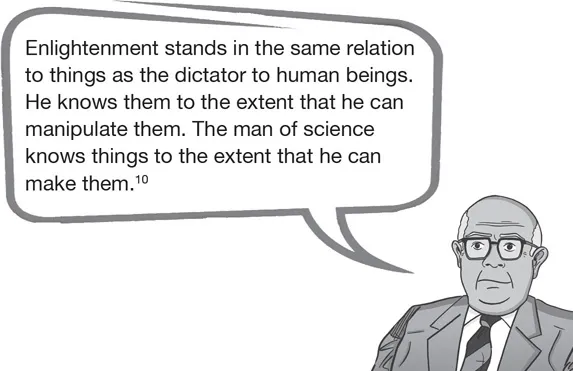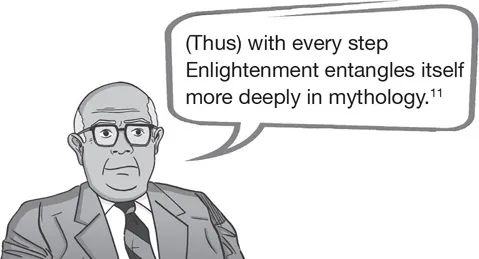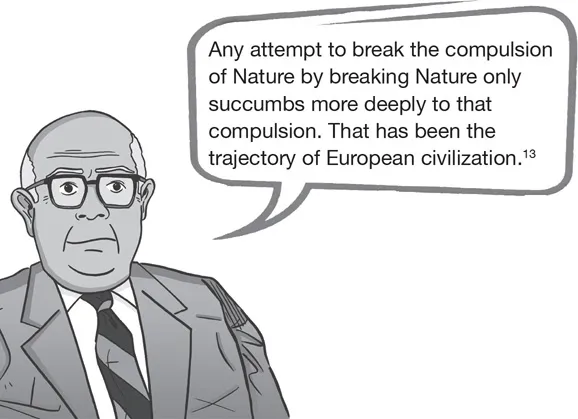![]()
Adorno’s Central Idea
The Dialectic of Enlightenment
The decisive catalyst for the forming of Adorno’s central idea was surely the experience of German Fascism and the Holocaust that it committed. On his return, then, from his American exile to a Germany almost totally destroyed by the war, it was two key questions, above all, that preoccupied Adorno. The first and most important of all was: how can we prevent Fascism, and most particularly such fruits of Fascism as the Nazi extermination camp at Auschwitz, from ever occurring again?
The second question was a more retrospective and analytical one, though to answer it was certainly to go some way toward answering the first: how was it even possible that, after hundreds of years of European humanism and Enlightenment, barbaric totalitarian rulers and regimes should have come to power, in the middle of the twentieth century, in no less than three great European countries: Spain, Italy and Germany?
Already during his exile Adorno had carried out social-psychological research related to this question and he continued these researches once back in Germany. The results, which were published in 1950 under the title The Authoritarian Personality, were shocking. Adorno’s evaluation of the various interviews conducted for the study concluded that, even after the experience of Nazism, some two thirds of the German population still took a sceptical attitude to the notion of a democratic political system. Half of the Germans interviewed rejected the idea that they and their countrymen bore any share of guilt for the terrible actions of the Nazi regime.
And a large proportion of them gave answers which were at least indirect indications that their personality-structures were such that they would willingly submit to some new authoritarian “strong man”, were one to emerge. But for Adorno these empirical findings were not the decisive thing. They revealed only facts which he had in any case already suspected to be the case. His great philosophical question was rather the following: how was it possible, after all the sterling service to the cause of the Enlightenment that is to be found in the work of men like Rousseau, Voltaire, Montesquieu, Leibniz, Kant, and Locke, for Europe and its population to still remain so susceptible to lapsing back into the darkness of brutal barbarism?
The answer that he offered to this question became the point of departure for the whole of Critical Theory. Enlightenment and modern science, argued Adorno, have indeed freed human beings from superstition. But they have established in its place a purely instrumental explanation of the world which is really no less dangerous. Because this strictly technocratic, instrumental account of the world and its meaning is one which runs a serious risk of leading back into the very irrationalism that it was meant to liberate from.
The cause of the problem here is that the concern animating science and scientific investigation has tended, from the start, to be that of how whatever is investigated and scientifically understood can be put to use:
“Find out what can be done with it” is the overriding imperative of modern science. Scientists, Adorno points out, do not wish just to rationally analyse and understand the world and the things that make it up but want in every case also to control these things. With every new bit of knowledge that is acquired one further step is taken in the moulding, dominating and manipulating of Nature. This is why science, in its very essence, has, as Adorno puts it, something “dictatorial” about it.
Darwin’s scientific development of a theory of evolution, for example, was originally very much an act of liberation: namely, from the irrational biblical myth of Man’s creation, overnight, directly by the hand of God. Very soon, however, a highly irrational use and applicability was found for this eminently rational discovery of Darwin’s. With his hypothesis of a process of “natural selection” in the animal kingdom Darwin had in fact, probably unintentionally, created a seedbed for the much more sinister hypothesis that such a principle of selection also governed human evolution.
Already half a century before Hitler the British scientist and philosopher Herbert Spencer took the doctrine of “natural selection” and applied it to the sphere of human society and history, founding what came to be known as “Social Darwinism”. He coined the phrase “survival of the fittest” and declared the struggle between peoples, races and nations to be a natural process. Darwin’s “natural selection” was suddenly no longer just a description of the interaction of certain natural forces; it was now made exploitable in terms of a specific human agenda, in this case a targeted agenda of “race war”. It was this agenda that was eagerly pursued a few decades later by the hundreds of real or purported scholars, professors, doctors and geneticists who were appointed, under Hitler’s Nazi regime, to newly founded university chairs in “Racial Science”. These supposed “scientists” spent their time gathering anatomical data on members of various ethnic groups, ranging from skull dimensions and physiognomies to height, skin pigmentation and IQ. Where this ended we already know.
With the rise of the “race delusion”, then, we observe an initially rational science turning into an irrationalism contemptuous of human beings. In the wake of Darwin’s originally rationally-grounded hypothesis regarding the origin of species and their development through natural selection there gradually grew up, under the covering mantle of science, the irrational myth of an “Aryan race” whose superior genetics would ensure their dominance over all the rest of the world:
To illustrate this inherent tendency of Enlightenment to turn back into the mythical superstition that it originally set out to overcome Adorno uses the anthropological concept of the “horde”. Such “hordes” had existed already in the properly speaking “mythological” era of humanity, the Stone Age, when the individual members of a mass of hunters or gatherers felt themselves bound together as if into a single body by the common belief in some mythical story or symbol – for example, the whole “horde”’s identification with a single “spirit animal”.
In the modern era, Adorno notes, such “hordes” make their appearance again. But this time what binds them together are purportedly rational explanations provided in the name of science: e.g. that certain masses of people “belong together” by reason of their all stemming from some single genetically identical sub-species or some “community of the race”. Such “scientific” arguments were, and continue to be, advanced even where the differences between one supposed “race” and another prove to be minimal.
Those individuals too, then, who buy into this notion of a modern “horde” in the form of a racially defined “national community” are succumbing, centuries after the supposed age of Enlightenment, to the superstition that the Enlightenment felt it had put an end to. Only this time it is a “scientific” superstition. This is, however, Adorno further argues, not just a matter of a lapse back into barbarism but rather displays a quality of its own which must be sought in the logic of the Enlightenment itself:
The good intentions of the movement of Enlightenment, in this case those behind the call for the equality of all human beings, are interpreted here by Adorno as also, unintendedly, paving the way for totalitarianism. He points out that these good intentions could easily, much like the results of the university chairs in “Racial Science”, be misused as bases for the reduction of all citizens to compliant members of a single “fraternity of shared blood”. Because, under such circumstances, anyone who dared to criticize the regime was taken thereby to have quit the genetically-defined egalitarian “horde” and to have automatically become an “enemy of the people”: someone who wanted to place himself outside of, or even above, the fraternal, equal “community of the nation”.
The movement we call Enlightenment began as a critique of the power of Nature over Man and specifically of the notion that certain social institutions were so rooted in Nature that they could not be opposed or altered. It aspired to replace this power of Nature, and of the “second Nature” of supposedly eternal social institutions, with the critical power of Reason. But in the end it succeeded only in replacing those constraints of Nature and “second Nature” expressed through the taboos of myth and religion with equally constraining taboos in the form of pseudo-science and its instrumentalizing rationality:
Even after the period of Fascism and the Second World War science and technology have still proven unable to free the human race in any real sense but have rather bound us into ever new forms of machinery. The institution of capitalism itself, Adorno points out, has now come to be perceived by many as eternally, immovably rooted in Nature, much like the social institutions that Enlightenment had most vigorously criticized, such as the divine right of kings or the “natural” inequality of the different classes of men. Many scientists look on egoism and the singleminded pursuit of personal profit as absolutely necessary natural drives, without which there would be no spirit of invention, no economic growth and no opening-up of new resources.
Best-selling books like The Selfish Gene by the respected scientist Richard Dawkins suggest that the “possessive individualism” which characterizes more and more cultures around the world is firmly rooted in unalterable n...





